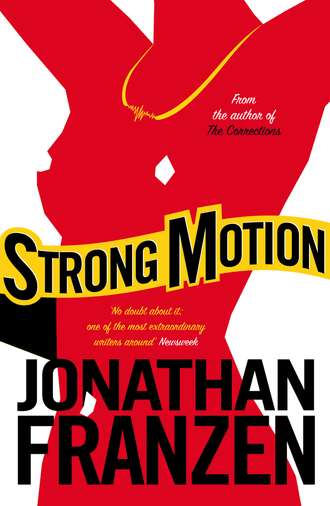
Полная версия
Strong Motion
Alec palpated his blue neck. “Mm—hm!”
At the studio board Louis sat down with a chocolate cruller purchased from Dan Drexel and glanced over the log printout for the six-to-seven slot. Drexel, using his palm to ram a 150-degree arc of doughnut into his mouth, changed places in the booth with the night announcer and read through his copy of the printout. There would be powdered sugar in Drexel’s lumberjack beard until his bathroom break at eight. (To the listener, few radio announcers sound bearded. But many radio announcers are.) Louis loaded Cart 1 with a 30-second Cumberland Farms spot, let it roll at 5:59:30, and cued Drexel. Morning Rush Hour News with a Twist began.
They were in the midst of a Bob Newhart Festival. “We’re playing every comedy recording,” Drexel reminded the audience, “that the Button-Down Mind ever made and WSNE ever purchased. In just one moment we’ll hear what must be an all-time favorite Newhart act, but first a roundup of world news.”
Louis cued up the fourth cut on Side Two of Behind the Button-Down Mind while Davidson Chevy-Geo talked financing.
“You have sugar in your beard,” he told Drexel.
As always, Drexel brushed at the wrong spot. The ad was ending, and he cozied up to the boom mike with a lusting cat’s unconscious simper. “Nineteen sixty-three,” he crooned. “And the Button-Down Mind takes on the surprising world of children’s TV.” On the word “TV” his pointing finger came to rest on Louis, who removed his thumb from the turntable and let it spin.
Four hours later the talk-show announcer Kim Alexander took over the studio board. Outside in the midmorning sun, Louis sat down by a willow tree on part of the grassy expanse that made the Crossroads Office Park a park. The lawn was one of those familiar suburban places where the concrete of the enclosing curbs hasn’t lost its white film of lime yet, and the agreeably nose-curdling smell of junipers hangs heavy, and there’s no litter, not even cigarette filters (or maybe one single piece of artful litter, in the Japanese style), and no one, but no one, ever picnics. Louis didn’t understand these spaces. Why astroturf and plastic trees weren’t used instead.
He watched a new Lincoln Town Car with smoked side windows round the cul-de-sac and ease to a stop opposite the WSNE entrance to Building III. Its vanity plate read: PROLIFE 7. Libby Quinn debouched from the passenger side and hurried into the studios. The Lincoln’s engine surged like a powerful man sighing: PROLIFE 7. Louis shrugged and lay back on the warm new grass, letting the sun saturate his optic nerves with orangeness.
It can make a person dizzy to lie in hot sun. For several seconds he thought the funny thing happening to him was due to a loose wire in his nervous system, some spazzing synapse, and not, as the chorus of car alarms from the parking lot suddenly indicated was the case, to an earthquake.
He lost several seconds scrambling to his feet. By the time he was upright the event was ending, the ground now moving almost imperceptibly, like a diving board when a person stands motionless at the very end of it, above a swimming pool.
Traffic on 128 was unruffled. Louis looked challengingly at the air around him, as though daring the physical world to do that again when his back wasn’t turned, just daring it. But the only disturbance remaining was the marginal instability of his own body, the swaying of legs through which blood was being pumped with less than perfect smoothness (even great mimes and palace guards can’t be statues). The ground itself was still.
Inside, as he approached Alec’s office, he heard the owner quarreling with Libby in the inner sanctum. Someone less attracted to fights might have retreated, but Louis stationed himself on the threshold of the outer office, which contained a ten-inch black-and-white Zenith and a sofa with folded bedding and unironed shirts on the armrest.
“I won’t return this man’s calls,” Alec said. “I refuse to know this man. But my station manager has breakfast with him? My station manager who I told, no, we don’t deal with this type person? I understand he’s a very goodlooking young man. Very moral, very char-is-ma-tic. It compromises you to have lunch, yes, or cocktails, or dinner. But breakfast—is a very moral meal!”
“Closing your eyes won’t make him go away, Alec. Not unless you can also find a couple hundred thousand dollars to buy him off with. He’s already filed the challenge.”
“So? Last time we renewed—”
“The last time we renewed, nobody challenged it and the station wasn’t gutted.”
“They don’t take away licenses so easily.”
“Plus Philip Stites hadn’t paid Ford & Rothman to study our audience.”
“So—blackmail! A very moral sing!”
“Face it. He wants a station.”
“And you’re going to work for this man? You’re going to be his station manager?”
“When you won’t let me collect on dead accounts? When all you can broadcast during drive hours is Somalian war news and Phyllis Diller?”
“People love Phyllis Diller!”
“One point seven percent at 8 a.m. That’s the March figure. I think it speaks for itself.”
“OK, we do some local noose. We do the war on drugs. We do airplane crashes. OK. All-new programming, as of today. We tell FCC, new programming, very noose-oriented—”
“Alec, there’s nobody to do the news, besides me.”
“Maybe we get Slidowsky back—”
“You know very well what I think of that girl.”
“I can do it. Louis can do it. We listen to the other stations and copy it down. We can hire a student, I can sell—”
“What can you sell?”
“I sell my car. When do I use this car? I don’t need this car.”
“I don’t know whether to laugh or cry.”
“But sink about it. Libby. Sink about it. I sell my station to Philip Stites, against my principles. Do you respect me for this?”
“I respect a man who does the responsible thing. And I think the responsible thing to do here is sell the station while you still might come out in the black.”
Alec muttered something vaguely, something about sinking.
“Do you need me?” Libby said to Louis, coming through the outer office.
Louis assumed a preoccupied air. “You feel the earthquake?”
She patted her bun and smiled demurely. “I guess I didn’t.”
“Ersequake?” Alec wore the expression of metaphysical amusement that came from sucking a nicotine lozenge. “Just now?”
“Yes. You feel it?”
“No … I was busy.” He beckoned Louis into his sanctum, where two cigarettes of different lengths were burning in a heaping ashtray. His shortwave was set up by the window, and along the wall were piled packing cartons. It was beginning to appear that these rooms were the only place he had to live.
“Two things,” he said. “Sit please. First thing, I thought again—is maybe not so bad to do those collections. If they won’t pay immediately, say we settle for half if they pay right away. It must be right away.” He selected the shorter of the burning cigarettes, killed it, and drew on the longer one, still rotating the lozenge in his mouth. “Other thing: honest answer. Do employees respect a boss who smokes?”
“Sure. Why not?”
“They appear weak. Smokers.”
“Are you talking about me or about Libby?”
Alec did a foreign thing with his upper lip, curling it like a vampire about to bite, behind a veil of smoke. “Libby.”
“I’m sure she respects you. Why wouldn’t she?”
Alec nodded very slowly, lip still drawn, eyes on an odd corner of the room. “Do those collections,” he said.
Louis returned to his cubicle and reopened the files, but his first call was to the Harvard University switchboard. After one ring he was speaking to Howard Chun, who with an unpromising grunt went to try to find Renée Seitchek. When her voice came over the line she sounded neither surprised nor pleased.
“I felt the earthquake,” Louis said.
“Uh-huh. So did we.”
“Where was it? How big?”
“Outside Peabody, smaller than Sunday’s. This we get from the radio, incidentally.”
“The reason I’m calling is to see if you want to go to a party my sister is giving on the twenty-eighth. Not that this is an idea I personally endorse, but supposedly it’s an earthquake-oriented party. A costume party. Will it be fun, I have no idea. But that’s what I’m calling for.”
He bent his head and listened extra-closely to what came out of the receiver.
“The twenty-eighth.”
“Yes.”
“Well—OK. But I’m not going to wear any costume.”
He released his breath, which he’d been holding. “Let me suggest that you wear some token costume. Like maybe a Band-Aid. Not that I personally—”
“All right. I’ll wear a token costume. Where’s this party going to be?”
He arranged to pick her up in his car. It turned out that she lived in Somerville herself. She gave him her home telephone number and said it was better not to call her at work. He hung up with a bad taste in his mouth, feeling unwanted.
A week of uneasiness ensued. After a couple of lucky collections Louis had begun to run into stonewalling receptionists, dilatory assistants, and a few outright ogres. He was also having trouble finding funds for postage. Once he’d exhausted the little caches of one- and two- and five-cent stamps from various abandoned desks, he had to draw on petty cash, which was kept in the owner’s wallet.
More and more often Alec could be found watching the little Zenith in his office. At dinnertime, alone or not, he provided running oral glosses on TV news and advertising; otherwise he liked to watch Westerns and war films.
“TV noose and noosepapers,” he told Louis, “are the enemy. For eight years we had a U.S. President with subnormal intelligence. Every day he does horrible harm to language, the future, the truth. Every single sinking person in the country knows this, except not the networks and noosepapers. Is suspicious, no? Or is maybe Stupid People now also minority group we don’t say bad things about? Let’s go all the way, let’s have a retarded President. And noose conference, and President is bellowing and drooling, and his advisers say, he has interesting new program, and CBS says, the President drooled tonight, and we have five analysts here to talk about his interesting new program and also perhaps about is he drooling less than last time? And New York Times prints a transcript of noose conference, is all drool drool bellow bellow, also one coherent sentence, and on page one they print the one coherent sentence! I guess they don’t want to offend retarded people by saying is bad to have a retarded President.
“Still, OK, fine, is their prerogative. But isn’t it the responsibility also of every sinking person in the country to say to networks and noosepapers: You are my enemy now. You betrayed me. You are not really on my side. You are on side of money and I see through you now and is the end. No more! You are out! I’ll find a good magazine and radio station, sank you!
“But it’s a horrible venal world. Sinking people—artists and intellectuals, the good reporters—must write for Times and talk to CBS, otherwise their enemies will. And so with blackmail the big noose media buy writers and intellectuals. Personally the media don’t give a fuck, Louis, they don’t give a fuck about truth. They’re just businesses that must always be making money, never stop making money and never offend any group.
“Now Mr. Pro-Life wants to buy my station because not enough people listen. Am I angry? Yes I am angry. But not politically angry. I wall not say,? disagree with these people’s politics.’ Because all politics is the same. Left, right, is the same! Exactly the same! But noosepapers must have readers and networks must have viewers, and without politics everyone could see this emperor of culture has no clothes on, so everything is politics! The far right gets nowhere if the media talk about what is beautiful and what is true and what is just, instead of what is politically feasible. The far right is not beautiful and not true and not just. Is their very good fortune only to be looked at politically …”
Though he was paid for only eight hours, Louis seldom left Waltham before six in the evening. He was surprised, one night at the end of the week, to find Libby Quinn sitting on the sofa in the TV room, breathing Alec’s smoke. Usually at this hour Libby was home with her daughters.
“Louis,” Alec said in greeting. “We have special programming tonight. A portrait of the man who—”
“Sh, sh, sh, sh, sh,” Libby said.
“I was just going to tell Louis—”
Louis ignored him. He was transfixed by the television. It drew him closer. He turned it up loud.
“We’re talking about a building,” the image of DR. RENEE SEITCHEK said, “that was condemned three years ago by the Chelsea city manager and that’s sitting on completely unconsolidated landfill. It’s hard to imagine a building more prone to damage in an earthquake, and to me it’s just insanity to allow 250 church members to be living in it, even if every one of them signed a waiver.”
“So you believe there could be further earthquakes,” an unseen male interviewer said.
“You can’t rule it out. Not after what happened in Peabody on Friday.”
“Dr. Axelrod at?G? told me he thinks the odds of a damaging earthquake in central Boston in the next twelve months are still less than one in a thousand.”
“They could be one in a million, there still shouldn’t be people living in that building.”
“I take it you’re not in agreement with Reverend Stites on the issue of abortion.”
As DR. RENEE SEITCHEK struggled to reply to this irrelevant question, the camera zoomed in on her until the tiny freckles around her eyelids could be seen. In her right ear she wore three small silver hoops in separate holes. Out-of-focus leaves and sunshine played in the window behind her.
“I don’t think a woman who terminates a pregnancy needs Philip Stites to tell her the significance of what she’s done.”
“Think again,” Libby murmured. “Think again.”
DR. RENEE SEITCHEK blinked in the bright lights, her face still filling the screen, while the interviewer asked a final question: “If it’s not OK for the state to interfere in a woman’s decision about abortion, why is it OK to interfere with the church members’ decision to live in the Central Avenue apartment block?”
“Because Philip Stites made that decision for them.”
DR. RENEE SEITCHEK’S reply had apparently continued from here, but the sound was cut off as the reporter brought viewers back to Central Avenue in Chelsea, where a female member of Stites’s Church of Action in Christ was leaving a bleak yellow-brick apart ment complex that had sheets of weather-bleached plywood on its windows.
“The reason I live in this yere building,” the woman said. “Is that I trust in God more than I trust in scientists and engineers. This yere’s a building with NO PROTECTION. The unborn have NO PROTECTION. But if God will protect me here, I’ve got the power to protect the unborn.”
“One scientist I spoke to,” the reporter said, “claimed it was Reverend Stites’s persuasion that made you sign the waiver, rather than your own free will.”
The woman held up a placard reading THANKS MOM I ♥ LIFE. “The will that moves me,” she told the camera, “is the same will as moves the Reverend Stites, and that is the will of God.”
“How does it feel to go to bed at night knowing that even a small earthquake could send all these bricks down on top of you?”
“There’s no man in this world that wakes up in the morning but by the grace of our Lord.”
The television’s response to this avowal was a perfume ad. Libby Quinn shifted on the sofa, looking around the room selfconsciously, as if she thought Louis and Alec expected her to justify herself. She stood up suddenly. “I’m a mother, Louis. You know I have two girls in high school. And what that little Harvard girl doesn’t understand is that to a lot of these teenagers, an abortion’s like a trip to the dentist. I know for a fact that there’s no one out there telling kids that what they’re flushing into Boston Harbor is tiny babies.”
“Ah, yeah,” Louis said. “Although these prolifers aren’t just trying to educate some teenagers.”
“These prolifers,” Libby said pointedly, “think it’s important to take responsibility for your sexual behavior.”
“What do you sink, Louis?” Alec said. Libby might have been a controversial film they’d been watching. “You agree with her? Take your time! Your future at this station may be at stake.”
“Let me ask you this, Louis,” Libby said. “Why do you think the people who hate economic greed always want to be excusing sexual greed? Why do you think that is?”
Alec turned expectantly to Louis, sucking his lozenge of amusement, his eyebrows raised.
“Economic greed hurts other people,” Louis said.
Alec’s eyes followed the ball back into Libby’s court.
“Right,” she said with an unhappy smile. “Sexual greed doesn’t hurt anybody. Unless you happen to consider a fetus a victim.”
It was an exit line; she left the room.
“And what does Vanna have to say to that?” Alec asked, changing channels. “No, no, Vanna stands higher than such concerns.”
Louis was trembling. He didn’t understand what he’d done to make Libby turn against him.
Alec leaned back comfortably on the sofa to soak up Wheel-of-Fortune rays. “Libby,” he said, “is an unhappy person. You forgive her, eh? She raised two girls without a husband. The man was no good. He came back and married her when the older girl was two, then left again. Is a hard life for her, Louis. She made a mistake twice. One time, OK, but twice, is hard to live with.”
“She’s selling you out,” Louis said.
Alec shrugged. “I owe her back pay, she’s ambitious. She should have gone to college, but she had her babies. Is hard for her to see girls have abortions now. You forgive her.”
Louis shook his head. He went outside into the twilit parking lot. “Hey, Libby,” he said. She was getting in her car. “Libby!” he said again, but she had closed the door. He watched her drive away.
It may be that to understand is to forgive; but Louis was tired of understanding. Almost everyone he knew seemed to have good reasons for not being kind and polite to him, and he could see these reasons, and yet it didn’t seem fair that it was always him who had to understand and forgive and never them. It seemed like the world was set up so that the unhappy people who did rotten things—the abused child who became a child abuser, the injured Libby who injured Louis and Alec—could always be forgiven because they couldn’t help what they did, while the unhappy people who still refused to do rotten things got more and more hurt by the other people’s rottenness, until they’d been hurt so many times that they too stopped caring what they did to other people, and there was no way out.
“Why aren’t you speaking to me?” he’d asked MaryAnn Bowles, a week after the previous Easter. She was making pickled beets in a haze of vinegar.
“I’m surprised you have to ask that,” she said.
“Oh, I’ve got a theory. But I wanted to check.”
She stuck a fork into a purple chunk of beet. “Well, Louis,” she said. “I’m not blaming you. But I guess you must know that I am very, very hurt by what’s happened. I am very, very, very hurt.” The sound of her own words made her throat tighten and her face crumple up. “AII I can say is this has nothing to do with you. She was only trying to hurt me. And I guess you can see”—her words continued to affect her violently—”that she succeeded very well indeed.”
Louis despised the woman. He loathed her powdered face, her heavy breasts, her naked misery. And the more he loathed her, the more he had the feeling—a caffeinated, weightless feeling—that Lauren really had seduced him on the floor of his bedroom. He had no desire to set the record straight. He became a bad son, subsisting on peanut-butter sandwiches and party food, crashing in people’s off-campus apartments and returning to Dryden Street only when he needed to sleep twelve hours. The Bowleses raised no objections; they didn’t like him anymore.
After his final exams he moved into a two-room apartment in a poor black neighborhood off Holman Street and started work at KILT-FM, doing the board during drive hours and otherwise punching keys. On the day after Commencement he returned to Dryden Street one final time, to collect his books. It was a trip he’d delayed in the hope of running into Lauren, and he was rewarded by the sight of a white VW Beetle in the driveway, with a U of Texas parking sticker on the windshield.
He went into the silent, airconditioned, sun-filled house. The door to the laundry room was ajar, MaryAnn probably ironing underwear in there. Upstairs he almost passed Lauren’s bedroom by, it seemed so much the way he’d seen it last. But today there was an extra element, a woman in a white sundress sitting crosslegged on the bed and reading. She looked up from her book, squinting because the sun was in her eyes. He braced himself for a blast of mockery, but as soon as Lauren recognized him she dropped her head again, biting her lip and scowling at the book.
“Yeah, surprise surprise,” he said.
The book on her lap was a Bible. She hunched over it determinedly and pretended to read it, evidently hoping he would leave. He remained in the doorway.
“I didn’t think you were still living here,” she murmured.
“On my way out right now.”
“Oh. Uh-huh. Lucky you.”
Someone seemed to have pulled the plug on the electrified woman he’d met two months ago. Without makeup and without malice her face looked like an empty page. Her hair was pinned up with a barrette, in the style of a ten-year-old groomed for church. She said, “Is there something you want?”
He stepped inside the room and shut the door. “Can I talk to you?”
“You’re not mad at me?”
“No.”
Her head drooped several inches lower. “I thought you’d be mad at me. I guess you must be a nice person.” She extended her left arm, spreading her fingers as though admiring them. She’d tied a piece of thin white string around her wrist. “You see I gave Emmett his ring back. Emmett’s been thinking about you all the time. I think he wants to kill you.”
Louis looked at her steadily.
“Actually that’s a lie,” she conceded, her eyes still cast down. “But he didn’t seem to think too highly of you. He didn’t think too highly of me either. I thought the whole thing was pretty funny. You know what MaryAnn did? She told me she thought I needed counseling. I just told her she was jealous. She acted like she didn’t know what I meant.” Lauren’s lip curled evilly.
“What are you doing this summer?” Louis said.
“I don’t know yet. Staying at home. Trying to be nice.”
“Can I see you?”
She looked up at him with something like terror. “What do you want to see me for?”
“Why does anybody want to see anybody?”
“I can’t.”
“Why not?”
“‘Cause I told Emmett I wasn’t going to see anybody. He’s working for his dad in Beaumont.”
“So you’re like engaged but not engaged. Fun arrangement.”
She shook her head. “It’s just I already made him so sick. He’s really a nice person, you know, not as smart as you.”
“Yeah, this is another thing. Where do you get the idea I’m so smart?”
“Well I only spent a whole vacation here at Christmas. I only heard how smart you are a couple hundred times. And you see how well I turned the other cheek.” She paused, appearing to consider her own history. “You know what, though? This semester, I got at least a? in every class. And I went swimming every day and I studied on Saturday night. I was on academic probation my whole sophomore year. It was like I’d go into the classroom and lie for an hour. Lie, lie, lie.” She looked up at Louis again and saw his skepticism; her eyes fell. “So anyway. I’m trying to read the Bible.”
“Congratulations?”
“I’m still more at the point where I like how I feel sitting here reading than where I’m actually reading. I go through the laws till I get to the sex laws. The punishment’s always stoning the person until they’re dead. That’s what you get for sodomy. Sodomy’s nice! But it’s an abomination unto the Lord.”








